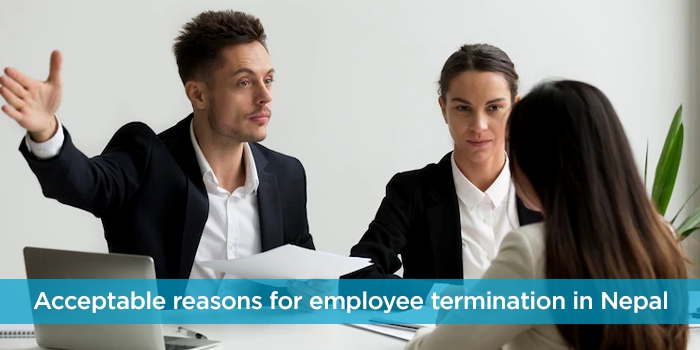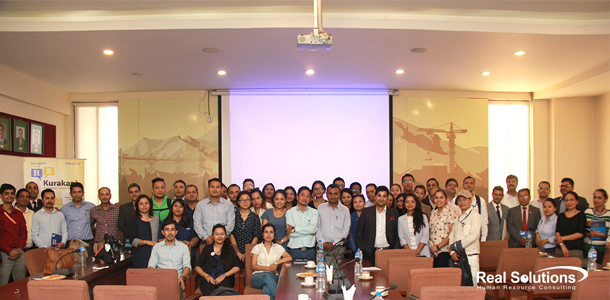You just hired someone who did exceptionally well in the interview, but as soon as they started working you realized some unhealthy patterns. The new employee is negatively impacting the office environment and the company overall.
Taking actions to protect the company's reputation, office rules and regulations are crucial, but in which cases and mistakes can lead to firing an employee?
If you are in a dilemma about what can be done, here is the list of acceptable reasons to terminate employment as per the Labor Act 2074.
Termination of employment:

Employers shall have a valid reason before terminating an employee. Here are some acceptable reasons for terminating employees based on their employment types.
Time-Based Employment:
In the case of time-based employment, termination is possible only after the time specified in the employment contract expires. Based on the nature of the work, if the employment or the period for the completion of such a work is extended, the employer shall not terminate until that period.
Work-Based Employment:
Termination is possible only after the completion of the work specified in the employment contract. If the employee is in work-based employment and the project is added or the period for the completion of such a work is extended, the employer shall not terminate until that work remains.
Casual Employment:
In the case of an employee in casual employment, termination can occur at the will of the employer or the employee.
Voluntarily
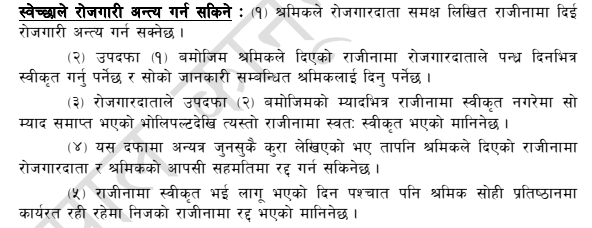
Voluntary termination occurs when the employee is willing to submit a written notice of resignation. For this kind of termination, such rules must be followed:
An employee, by resigning in writing to the employer, terminates the employment.
The employer shall accept the resignation submitted within fifteen days and approve the employee.
Where the employer does not accept the resignation within the time limit referred to, i.e. 15 days, such resignation shall be deemed to have been accepted.
The resignation submitted by the employee may be canceled through mutual consent and agreement between the employer and the employee.
Suppose the employee continues working in the same enterprise even after the day on which their resignation is accepted and becomes effective. In that case, their resignation will be deemed to have been canceled.
Poor work performance
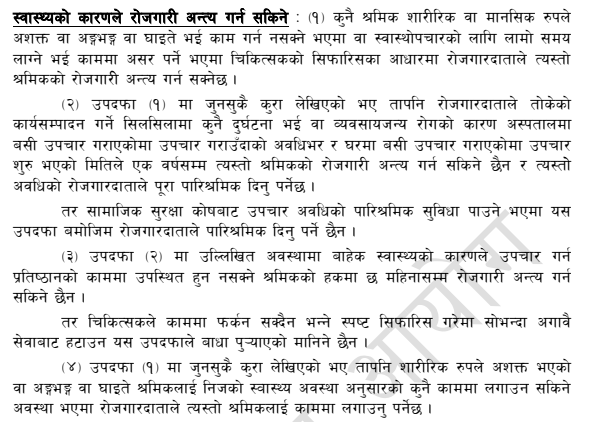
An employer may dismiss an employee based on his/her poor performance. Here are a few things that employers need to consider before terminating the employees.
If, while evaluating the work performance of any employee, the work performance is found unsatisfactory or poor for three or more three consecutive years, the employer may terminate the employment of such an employee.
Before terminating the work performance evaluation must have been made. The employer of any enterprise employing ten or more employees should give at least seven days to the concerned employee an opportunity to submit an explanation.
Long-term health problems
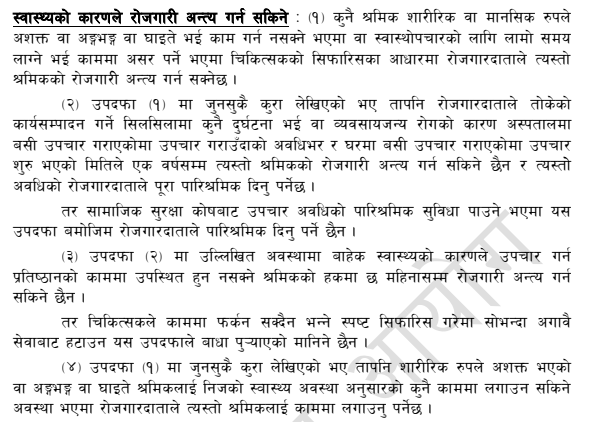
Prolonged illness can sometimes cause employees to stop working. This could mean that either they need to resign or employers have to terminate their employment. As per the Labor Act, an employer can dismiss an employee under the following circumstances.
Where an employee becomes incapable of working as a result of physical or mental incapacitation or grievous hurt or injury or it affects the work because of a long time required for medical treatment, the employer may, based on a recommendation by a medical doctor, terminate the employment of such an employee.
The employment of any employee may not be terminated during the period he or she is undergoing treatment in a hospital because of an accident or occupational disease while performing the work specified by the employer or until one year from the date of commencement of his or her treatment at home if he or she is undergoing treatment at home, and the employer shall provide full remuneration during such a period. Provided that the employer shall not be required to provide remuneration if the employee is entitled to receive the remuneration facility from the Social Security Fund for the period of treatment.
In the case of an employee who is not able to attend the work of the enterprise on the grounds of medical treatment, the employment of such an employee may not be terminated until six months.
In cases where the employee who is physically incapacitated or has sustained grievous hurt or injury can be engaged in any work suitable to the condition of his or her health, the employer shall engage such an employee in work.
Compulsory retirement

Regular employees should get a mandatory retirement after reaching the age of 58. If due to certain reasons compulsory retirement must be made before the age of 58. Such provisions can be made with approval from the Council.
Before ending employment, the employer must provide a notice period for termination explaining the reasons for dismissal.
If you would like to learn more about the Labor Act, specifying responsibilities and rights in employment, particularly the responsibilities of the employer check HR Insider.
